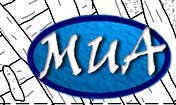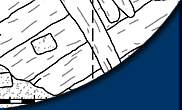
Scientific Diver Training Week
May 26-29, 2009
By Tiffany Goldhamer
The University of West Florida (UWF) Maritime Archaeology Field School always begins with a week of Scientific Diver Training. This summer the training week began the day after Memorial Day. During this week, the students were introduced to basic SCUBA and archaeology training. The four-day week consisted of several workshops that taught students the skills they will need for this summer’s excavations. This summer is very exciting because field school coincides with the 450th anniversary of Tristán de Luna’s attempted settlement of Pensacola.
Tuesday morning began with an introduction to UWF Marine Services Center (MSC) where all the boats and dive gear are stored. This year MSC is in a new and larger facility. Everyone was excited with the new amenities. A briefing on the scientific diver manual was given and all the required paperwork completed. The supervisors provided a welcome lunch, which was a great way for the students to get to know each other.
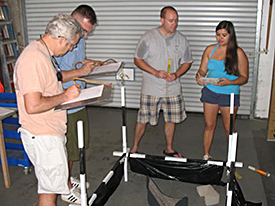
Chris Dvorscak, Gary MacMullen, and Mercedes Harrold learn mapping from Scott Sorset.
After lunch we began training. The archaeology skills were demonstrated and practiced on land first, in preparation for Thursdays’ practice in the swimming pool. Seventeen students were split into five groups to complete the tasks. Scott instructed the students in mapping and drawing. Irina and Sarah showed them compass navigation and circle searches. Jake taught them how to set up the dredges. Colleen explained how artifacts will be collected and inventoried. Finally, Elizabeth and Tiffany discussed the various equipment and software UWF uses for survey.
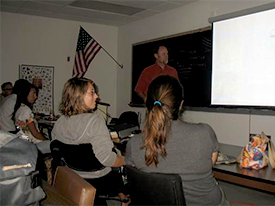
Dr. Bratten gives a lecture on the Emanuel Point Shipwrecks.
Wednesday was a half day for the students. In the morning they watched presentations on the Emanuel Point shipwrecks and Iberian ship construction. There was also a tour of the UWF Conservation Lab during which the students looked at several artifacts recovered during the 2008 field school. All of this helps them understand what they are looking at on the EPII site. The students were then given their field books and told to write in them everything they see and do during field school. This firsthand record of the excavation is vital to archaeologists after fieldwork has finished because archaeology is a destructive process. At noon, the students had the rest of the day to take care of any last minute gear purchases, physicals, or paperwork needed for field school.
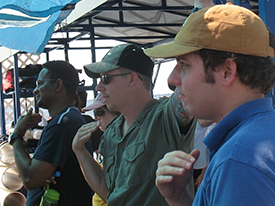
Guest Dr. Martin, Chad Gulseth, and Matt Gifford give the “out of air” sign during the safety brief on the UWF Barge.
Thursday started with CPR/First Aid classes for students who were not already certified. There are many aspects of this field school, such as hauling SCUBA tanks or encounters with marine life, that can result in injury and everyone must be prepared. After a break for lunch everyone met at the UWF pool to begin the swim test. After the swim test the students practiced their SCUBA skills. The final aspect of the pool day is to complete the archaeology tasks practiced on dry land Tuesday.
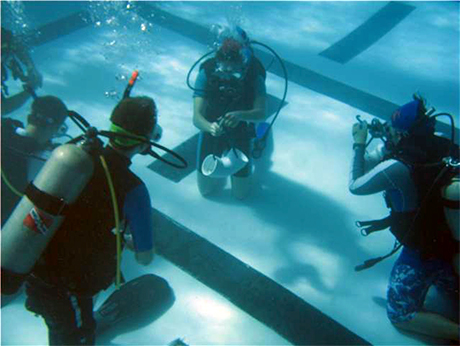
Colleen Reese demonstrates a knot for the students.
The final day of UWF Scientific Diver Training is an open water test of the skills practiced in the pool. The UWF Barge, located in Pensacola Bay, is our primary dive platform. Students repeated Thursday’s SCUBA and archaeology skills in the bay. The students will have many opportunities over the next 10 weeks to use the skills learned during scientific diver training week.
Please feel free to contact us if you have any questions or concerns at: mua@keimaps.com.
Return to Project Journal home page.
